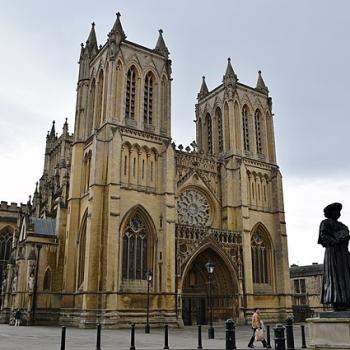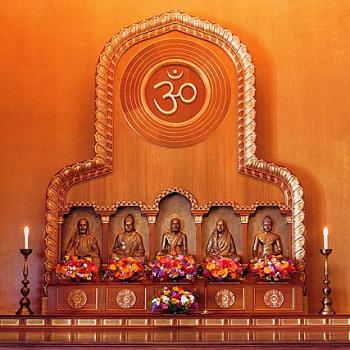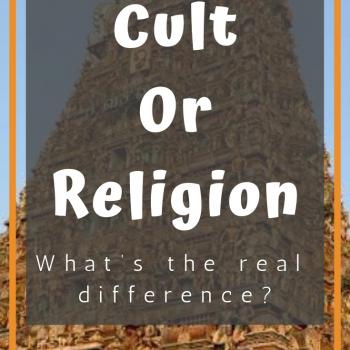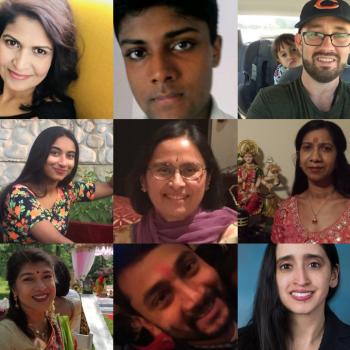Have I taught Brad well or what? Look at him all fluent in The Mahabharata! Also it’s kind of hilarious how we try to “catch” each other. I think it’s a strength of our marriage that we can have fun with that and not get defensive.
Transcript
[Intro]
Ambaa: So you said something really interesting the other day about defining religion by something–by it having both sacred and profane definitions within it? And that that’s like why a political party isn’t a religion.
Brad: Mm-hmm
Ambaa: And I liked that definition but it got me thinking what does that mean to have something that’s sacred. Do you have any further thoughts on that?
Brad: I do. So first off I want to give credit where it’s due. I think the definition of religion as something that has the categories of sacred and profane is from William James. From his book The Varieties of Religious Experience. But when I got thinking about it (because your thinking about it inspired me to think about it) I think sacred is something that is good in and of itself. And something that is profane is something that is evil in and of itself. Regardless of its actions or motivations. What is “good”–or what is “sacred” is good for its own *being* (not even for its own sake). And what is “profane” is what is evil for its own being.
Ambaa: Okay, so in things outside of religion? You don’t think that they have a definition of, like, “this is the good.”
Brad: I think there is a definition of “the good” but I think oftentimes it’s a utilitarian definition where something that is a result of what it’s done is good or bad and that makes it good or bad. Or something from its intention makes it good or bad. And I think what makes religion special–or what makes the categories of sacred and profane special– is that no matter what, by its very definition, the sacred is good. No matter what your intention is, it is good.
Ambaa: Hmmmm
Brad: And no matter what, the profane is evil. No matter what…action comes from it. It remains evil by definition.
Ambaa [smiles]: I think you’re supporting the idea that Hinduism isn’t a religion.
Brad: Am I?
Ambaa: Yeah, because–well at least in Advaita– we don’t really have an evil.
Brad: Wasn’t Duryodhana acting…evily?
Ambaa: But you just said it’s not about intentions and actions, it’s about, like, base-level somebody’s core something. Isn’t that what you said?
Brad: It is. But–
Ambaa: Yeah. Duryodhana’s not evil incarnate because there’s really no such thing. He behaved in an evil way within the play, like we talked about last week, because that was part of his role…He still went to heaven! [side note: this is a very different definition of heaven from the Christian one].
Brad: Uh. Well, okay, that’s true. That is a good point. What about the–save some notable exceptions (Hidimbi)–what about the rakshasa and the other demons? Not just the rakshasa but also the uh… I’m forgetting the name.
Ambaa: Asura?
Brad: Asura. Aren’t they evil for their own sake? And did Hidimbi wind up in the heavens after the battle? For that matter, did Ghatotkacha?
Ambaa: Mmmmm. Good questions. I don’t know. Don’t know the answers to those.
Brad: And I know that Krishna died a pauper’s death because of his karma, but wasn’t he perfectly good? Weren’t all the things that he did the best that they could have been no matter what?
Ambaa: Okay. I mean, I’ve gotcha on the good side.
Brad: Yeah.
Ambaa: It’s on the evil side that I’m questioning. Because, um, I think, at least in my understanding of Advaita, it’s really like the Shakespeare quote: “Nothing is good nor bad but thinking makes it so.” And I don’t know if all Hindus feel that way, probably not. I have that, kind-of, relativism of even if something seems bad, it’s playing its purpose, it has its role, I guess.
Brad: Yeah. But I don’t know, I mean it seems like with Hinduism and Buddhism (and Taoism to a lesser extent) what is good–what is sacred– is being knowledgeable and self-aware…of your situation. So in Hinduism that means playing your part within the larger drama that Brahma is putting on. In Buddhism it means realizing that this is all an illusion and that it is a sacred thing to realize that all of this is not real and not be attached to it. And what would be evil, in and of itself, would be to not acknowledge that, not understand that, and be ignorant.
Ambaa: Yeah, ignorance is a big thing. And adharma: things that are against the dharma. But it’s like…it’s never forever.
Brad: Well yeah, no. I mean nothing is…
[laughter]
Brad:…forever except existence.
Ambaa: The impermanence of the world! I just mean that even adharmic behavior, like, the person who committed that can change, can do things differently.
Brad: Mm-hmm
Ambaa: It’s not, like, set in stone. The way I feel like it is for Abrahamic religions.
Brad: No, I agree with that. And while I acknowledge an existence of the category of profane there’s not the sort-of…”profanity” that is forever either. I mean, it seems like just as Devas are not Devas permanently (they kind-of cycle through reincarnation) I would imagine the Asura do as well.
Ambaa: Yeah, yeah, good point.
Brad: So it’s not about forever living in punishment. But it is about, you know, the journey of your soul and you have to go through a lot.
Ambaa: So do you think those sacred and profane things are like in this exact moment, whatever you’re looking at in this moment you can say, “this is sacred. This is profane”?
Brad: I don’t know that a human mind can truly comprehend what is perfectly sacred and what is profane because we don’t have perfect knowledge. Unless we’ve attained enlightenment…in which case, yes.
Ambaa: But then–but the religion places some categories, some definitions on like– criteria. That’s the word I’m looking for. “This is sacred, this is profane.”
Brad: Yes, but I see a really big difference between the Abrahamic religions, which have very distinct laws, and our religions, which, you know, there are laws but they’re based upon principles and the principles are more important than the letter of the law.
Ambaa: Absolutely. And the ability to change also, I think that was something that came up a lot when I posted the video asking for other people’s definition of what makes Hinduism a way of life v.s. a religion. The thing that came up a lot was that, um, religions have a book that must be followed or a prophet that’s already dead and what he said is set in stone. That things are not changeable. Whereas Hinduism is capable of growing with new knowledge that comes up and working with society as it changes.
Brad: I think that the definition you just gave of religion is very western and particularly–
Ambaa: [laughs] How ironic!
Brad: –Christian-centric. Because it presupposes that there was a person who could talk to God and they wrote some things down and had some followers.
Ambaa: Well, this is what I’m saying. It’s Hindus looking at Abrahamic peoples and how they define themselves and saying, “oh, we are different from that because we don’t think that there was a book, a person that…cannot be questioned.” I guess.
Brad: Oh, I see. So, I think..The reason I use the definition of religion that I use is because it’s inclusive. It includes the religions of the book and the religions–
Ambaa: Well yeah, that was the question. Is Hinduism a religion?
Brad: –of practice. And I think it’s important to have a definition of religion that includes Buddhism and Hinduism and Taoism and even Confucianism in them because those socially…they act like western religions do as a place in life.
Ambaa: In society.
Brad: Yeah. In society.
Ambaa: And, like, the Himalayan Academy brought up a really good point one time that it’s good to be defined as a religion because religions get certain protections and we want that for ourselves even if we’re not quite as…organized…as another type of religion might be.
[baby playing break]
Ambaa: So I’m still never really sure how to define religion and faith. And if they’re the same thing or not.
Brad: So I think I have a definition of faith that may be too narrow. But I’ve never liked the idea because to me the idea of faith is to believe in something that you have no reason to believe in and cannot, under any circumstances, be experienced. ‘Cause that’s the way it’s been presented to me–
Ambaa: Mmm, yeah, I don’t like that definition.
Brad: –mostly by Christians? Because their idea of faith in God is believing in something that can never be proved and you have, you know–
Ambaa: Right, so if something seems to go against the very fabric of creation and how things work, they just shrug and go, “Oh, well, you can’t understand God. That’s why you have faith.” So–
Brad: Exactly.
Ambaa: –don’t bother trying to understand it. Which, yeah, I can’t get behind that.
Brad: Yeah, so I’ve really kind-of abandoned the idea of faith as something that I would want to have as a part of my religious life. I mean, I feel like in Buddhism in particular every reason to be Buddhist is just that: reasoned. It is you have an experience of “there is suffering” and you have the experience of “maybe suffering has a cause” and, if I take these steps, perhaps I can be released from this suffering. And you can see the results over time based on a practice of meditation. And it’s very much like “do you experience this too? All right, then try this.” It’s prescriptive. [We both apparently like this word. I don’t think I use it right though!]
Ambaa: [nodding] Mm-hmm. And Hinduism has the, um, like, the divine is within you, you are capable of tapping into that. So as you search for answers you don’t have to just say, “Oh, this person outside of me said this, so I guess I better follow them.” You do have that ability also to say, “Oh, this has been my experience, let me try this, let me try this, what brings me peace and comfort and satisfaction in myself? And, you know, you can tap into that universal…consciousness slash God.
Brad: Yeah. I mean, even in Taoism (and Taoism has a lot of esoteric study, like study of chi and whatnot) the…sure, at first you can’t feel it, you can’t experience it ’cause you have to refine your senses. But it’s not something that is unperceiv-ABLE. Like, you just have to go through a process to be able to feel or, you know, move the chi. And that is a process that I guess you could say you have to have faith in but it’s not like Christian faith because you can never experience God, I suppose, until you’re dead.
Ambaa: Yeah, according to their model, their definition of God.
Brad: According to their model. Yeah. And that’s what their faith means. And so, you know, the thing is I don’t think I need faith in order to be able to trust my teachers and my teachers say, “keep doing this and you’ll have these experiences.” And, low and behold, I’ve had experiences. So…
Ambaa: I’m still trying to think what my definition of faith even is. I don’t know.
Brad: I really think of it as trust in something you have no reason to trust in. And that you will never experience.
[laughter]
And again, I acknowledge that that definition is really narrow.
Ambaa: The trust thing I can get behind. It’s sort of like…trusting that there will be a result, trusting that sanskara and karma work, trusting that um…
Brad: But I think trust and faith are two different things and faith is a special kind of trust. And it’s something that I don’t believe anyone really has. [smile] Because why would you believe in something that can never be proven?
Ambaa: Yeah.
Brad: I mean–
Ambaa: There’s no reason for it!
Brad: The reason is that someone you trust told you you should.
Ambaa: Yeah.
Brad: But I don’t think that’s…faith.
Ambaa: And that’s someone that–a source that told you it was trustworthy said, “if you don’t do this then you’re going to be punished. Forever and ever and ever and ever and ever.”
Brad: Yeah. And then you have Pascal’s wager. Which is a whole other issue.
Ambaa: Yeah, well I think I talked about that in my defending Hinduism–or How To Explain Hinduism post about, like, if you’re going to do something just because it might be true…well, you’re gonna be doing a lot of crazy stuff.
Brad: [laughing] That is true.
Ambaa: ‘Cause there’s a ton of religions out there! And plenty of them that say “this is the way.” So, okay, better do all of it!
Brad: Yeah.
Ambaa: But yeah, I’ve never trusted the idea of a God that would punish you for all eternity because you didn’t get the right answer in, say, 30 to 80 years. Out of the billions of years of the planet! [laughing] It’s just like, how does that make any sense? But then again, sense is exactly what it doesn’t need to have. According to this…
Brad: Yeah. Yep. [laughter]
Ambaa: And this is why I think, too, that Hinduism and Buddhism are not contradictory to science. That it’s really easy to both trust and believe in science and understand science and also be religious. And there are, certainly, people of Abrahamic faiths who are capable of doing that, capable of understanding that but, um, it’s not as easy. You have to kind-of jump through more hoops, I think.
Brad: I think also this is a reason why the two of us, even though we’re different religions, can be in such agreement. Because we both, you know, we’re not at the point where one of the two of us can prove whether there is Atman or Anatman.
[laughter]
We just have a belief and we both acknowledge that each of us has an opinion but neither of us knows.
Ambaa: Well there you go, there’s faith.
Brad: What do you mean?
Ambaa: Neither of us knows. We have a belief, we have a thought–
Brad: I am 100% willing to change my belief–
Ambaa: We are open to–well, that’s the thing. To open up your definition of faith a little bit and say: We have what we think is the truth and what we think is the way that things work but we’re open to seeing evidence of it being different. And going, “okay, let me reexamine, let me rethink this.
Brad: But isn’t that the opposite of faith?
Ambaa: Right now while we have something that is unproven we have faith in it. Until more evidence comes along?
Brad: I suppose but I don’t…without that…It doesn’t seem like it’s a special kind of trust. Other than just trust in my teachers. And my own reason. Slash your teachers and your own reason. In your case.
Ambaa: Yeah. [Light flickers off] Woah. [looks around] Oh, the lightbulb went off.
Brad: Yeah.
Ambaa: I don’t know why it does that…Poltergeists! [laughter]
Brad: Speaking of things that cannot be percieved…
[Tripod falls]
Brad: You said poltergeists.
Ambaa: And you shook the baby, which is shaking the bed, which is shaking the camera.
[pan to laughing baby]
Ambaa: Hi! Hi, little man!
Brad: [tickling baby] Chi,chi, chi, chi, chi, chi, chi
Ambaa: Okay, so I will open it up to you: What do you think the definition of faith and religion is? Well, I already asked about religion. What do you think faith is?















